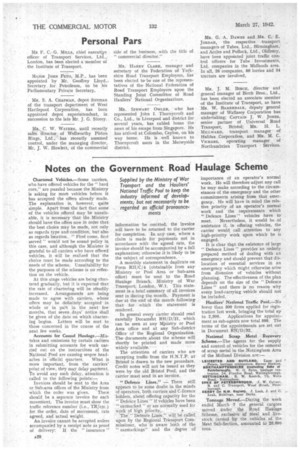Notes on the Government Road Haulage Scheme
Page 22

If you've noticed an error in this article please click here to report it so we can fix it.
Supplied by the Ministry of War Transport and the Hauliers' National Traffic Pool to keep the industry informed of developments, but not necessarily to be regarded as official pronounce
ments
Chartered Vehicles.—Some carriers, who have offered vehicles for the " hard
core," are puzzled because the Ministry
is asking for more vehicles before it has accepted the offers already made.
The explanation is, however, quite simple. Apart from the fact that some of the vehicles offered may be unsuit able, it is necessary that the Ministry should have the offers now in order that the best choice may be made, not only as regards type and condition, but also as regards location. " First come, first served" would not be sound policy in this case, and although the Minister is grateful to all carriers who have offered vehicles, it will be realized that the choice must be made according to the needs of the scheme. Unsuitability for the purposes of the scheme is no reflection on the vehicle.
At this stage vehicles are being chartered gradually, but it is expected that the rate of chartering will be steadily increased. Arrangements are being made to agree with carriers, whose offers may be definitely accepted in whole or in part in the next few months, that seven days' notice shall be given of the date on which chartering begins. Letters will be sent to those concerned in the course of the next few weeks.
Accounts for Casual Haulage.—Mistakes and omissions by certain carriers
in submitting accounts for work car ried out on the instructions of the National Pool are causing seNeere head
aches in --officih.1 quarters. What is more important, from the carriers' point of view, they may delay payment. To avoid any such delay, attention is called to the following points:— Invoices should be sent to the Area or Sub-area offices of the Ministry, from
which the order was given. There should be a separate invoice for each movenient. The invoice must show the traffic reference number (i.e., TR/etc.) for the order, date of movement, rate agreed, and actual weight.
An invoice cannot be accepted unless accompanied by a receipt note as proof of delivery': If the " insurance " information he omitted, the invoice will have to he returned to the carrier for completion. In any case, where a claim is made for payments not in accordance with the agreed rate, the invoice should be accompanied by a full explanation; otherwise it is likely to be the subject of correspondence.
A monthly statement in duplicate on Form RH/C/4 (obtainable from any Ministry or Pool Area or Sub-area office) must be sent to the Road Haulage Branch, Ministry of War Transport, London, W.1. This statement is a brief summary of all invoices sent in during the month. Payment is due at the end of the month followingthat for which the statement is rendered.
In general every carrier should read carefully Document RH/D/21, which can be seen at any Ministry or Pool Area office and at any Sub-district Office of the Regional Organization. The documents about the scheme will shortly be printed and made more widely available.
The attentiOn of carriers who are accepting traffic from the H.N.T.P. at Bristol is drawn to the new procedure. Credit notes will not be issued as they were by the old Bristol Pool, and the carrier must send in an invoice.
" Defence Lines." -There still appears to be some doubt in the minds of operators, both carriers and C-licence holders, about offering capacity for the " Defence Lines" if vehicles have been " earmarked " or are normally used for work of high priority.
The-" Defenee Lines " will be called upon by the Regional Transport Commissioner, who is aware both of the " earmarkings" and the degree of
importance of an operator's normal work. He will therefore adjust any call he may make according to the circumstances of the emergency and the other commitments arising from that emergency. He will have in mind the relative priority of an operator's normal work and the requirements which Defence Lines " vehicles have to meet. Nevertheless, it would be of assistance if, in offering vehicles, the carrier would call attention to any high-priority work upon which he is engaged.
It is clear that the existence of large "Defence Lines " provides an orderly prepared method of dealing with an emergency and should prevent that dislocation of essential services in. an emergency which might otherwise arise from diversion of vehicles without planning. The effectiveness of the plan depende onthe size of the " Defence Lines " and there is no reason why every load-carrying vehicle should not be included.
Hauliers' National Traffic Pool.—No fewer than 300 firms applied for registration last week, bringing the total up
to 2,300. Applications for appointment as sub-agents now total 500. The terms of the appointments are set out in Document RH/D/32.
National Scrap Metal Recovery Scheme—The agents for the supply and control of vehicles for the removal of scrap metal in the Nottingham Area of the Midland Division are:— LEICESTER AND RUTLAND. Laneend Peters, haulage contractors, Stoney Stanton. NORTHAMPTONSHIRE ceeesuctine Solo of Peterborough). W. G. Eales, haulage contractor, 34, Flnedon Road, Wellingborough. NOTTINGHAM. R. W. Keetch, 72,. Welts Road, NOLtingham. SOKE OF PETERBOROUGH. J. W. Calvert, E. and C. Transport, Wood Street, Peterborough. DERBY (in N.W. Region). J. Leah, J, and G. Leah, In:Wings, near Derby.
Tonnage Moved.—During the week ended March 7 the general cargoes moved under the Road Haulage Scheme, exclusive of meal and livestock carried by the vehicles of the Meat Sub-Section, amounted to 20,000 tons.




















































